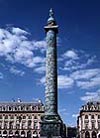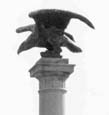| |
| |
THIS MONTH'S BOOK
Nelson – The New Letters, edited by Colin White
During his five-year Nelson Letter Project, Colin White uncovered around 1,200 new or unpublished letters. This book presents over five hundred of these, dating from 1777-1805, which together form a narrative of Nelson's life and career in his own words.

|
|
|
| |
 |
 |
STOP PRESS!
The Vendome Column to be moved to the esplanade in front of Les Invalides
Following a meeting of the conseil municipal de Paris (Paris town council) on 31 March, the Mayor of Paris, Bertrand Delennui, has announced the successful outcome of negotiations between the council and certain Napoleonic associations to have a special commemoration of the bicentenary of the Austerlitz campaign. During the meeting, the architectural consultant for the capital, Monsieur I. M. A. Mason, remarked that since the column in the Place Vendôme was in effect an architectural nonsense, it made better sense to move it to a place where it would be more effective. Indeed, such was also the opinion of the painter, Gustave Courbet, president of the Commission des Arts (Arts commission) of the Government of National Defence in 1870, which had proposed that the column be moved to the Invalides. Taking up Courbet's «republican» idea, Delennui had suggested that the column be transferred to the centre of the esplanade in front of the Invalides in line with the emperor's tomb and the Pont Alexandre III, and that it should receive the statue of Napoleon which is currently languishing in the Cour d'Honneur at the Invalides. According to city spokeperson, Monsieur C. du Pipeau, work will begin soon with the inauguration to take place on 2 December, 2005. The column's name will be changed to the Austerlitz Column and the esplanade's to Esplanade Napoléon. Watch this space...

|
|
|
| |
EVENT
Norman Cross Appeal Inauguration
On Saturday 2 April 2005 His Grace the Duke of Wellington will unveil a monument to the memory of more than 1,700 mostly French prisoners of war who died at the Norman Cross prisoner of war camp near Peterborough between 1797 and 1814.

|
|
|
|
|
| |
200 YEARS AGO
Leaving Paris on 10 Germinal, An XIII (31 March 1805) for Italy, where he was to be crowned king, on 14 Germinal (4 April) Napoleon stayed in Brienne and visted the ruined remains of his old military school.
On 14 Germinal, An XIII (4 April, 1805), Pope Pius VII left Paris at half-past one on his way back to Rome. Over the morning a crowd had gathered in the courtyard of the Tuileries palace with the hope of seeing the Holy Father and receiving a blessing.
Journal des Débats, 15 Germinal, An XIII

|
|
|
| |
In April 1805, Philippe Pinel was appointed consultant doctor to the Emperor.
Philippe Pinel (1745-1826) is considered as the founder of modern psychiatry, in that he changed the course of the study of madness and ways of treating it. He had a more humane approach, using what he called his «traitement moral» for mental diseases. During his second posting, at the Salpêtrière hospital in Paris, he was asked by Interior Minister, Chaptal, to adopt more humane methods. Indeed the minister had decided that treatment conditions could be improved if patients suffering from all different sorts of illnesses could be gathered together in the same place - contemporary practice had been to keep them separate.
Pinel is perhaps best known for his Traité médico-philosophique sur l'aliénation mentale ou la Manie (Medico-Philosophical Treatise on Mental Alienation or Madness) (1800, 2nd ed. 1809), and his La Nosographie philosophique ou méthode d'analyse appliquée à la médecine (1st ed. in 2 volumes 1798; 2nd ed. in 3 vols 1802-1803) (Philosophical classification of diseases or analytical method applied to medicine), and Médecine clinique (1st ed. 1802, 2nd ed. 1804) (Clinical Medecine).

|
|
|
| |
150 YEARS AGO
In preparation for the presentation of the wines of the Gironde at the Paris Exposition Universelle (which was to be held from 15 May to 31 October, 1855*), Napoleon III asked the Bordeaux Chamber of Commerce to establish "a classification based on many years of experience". All red wines were included, but only sixty Médoc and one Graves crus were selected to be ranked in five classes. Château Lafite-Rothschild (Pauillac), Château Latour (Pauillac), Château Margaux (Margaux) and Château Haut-Brion (the only Graves cru to receive a class) formed the first class. In 1973, Château Mouton-Rothschild (Pauillac) was moved from the second to the first class crus.
* Initially planned for 1 May, the inauguration of the exhibition was postponed until 15 May because work on the exhibition was so far behind schedule.
Wishing you an excellent, Napoleonic, week!
Peter Hicks
Historian and Web editor
Interested in the work of the Fondation Napoléon? Why not participate, either generally or in a specific project, by making a donation.
© this Napoleon.org weekly bulletin is published by the Fondation Napoléon. Reproduction or all or part of this bulletin is forbidden, without prior agreement of the Fondation Napoléon.

|
|
|
|
|
|
THIS WEEK
Snippets
- Norman Cross appeal inauguration
Just published
- Disraeli: A Personal History, by Christopher Hibbert
What's on
- For Napoleonic and Nelsonian 2005 bicentenaries, watch our 2005 bicentenaries page
- Special event: Choral Evensong at St Pauls Cathedral, in honour of Trafalgar, London, UK
- Tour: Portsmouth Dockyard in the Age of Nelson, Portsmouth, UK
- Fair: The International Napoleonic Fair, St Albans, UK
- Exhibition: Decoration in the Age of Napoleon: Empire Elegance Versus Regency Refinement, New York Public Library, US
Exhibition: The Treasures of the Fondation Napoléon, Paris, France
The monthly titles
- This month's book: Nelson – The New Letters, edited by Colin White
- This month's painting: Allegorical drawing to the glory of H. M. the Emperor, by Innocent-Louis Goubaud
- This month's article: Napoleon and Charlemagne, by Thierry Lentz
- In the Collectors Corner, 'Nécessaire' belonging to the Duchesse d'Otrante
Got a problem with a link in the letter? Try the homepage http://www.napoleon.org
<<
|
|




